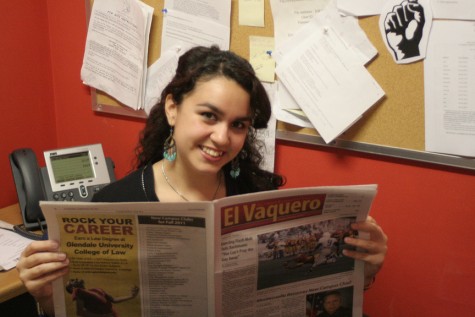The auditorium buzzed with excitement as hundreds of people, young and old, swarmed the aisles, anticipating the glorious music their ears were yearning to hear. On stage, music stands and chairs sat unattended, longing for the moment that the sounds of feet could be heard, as the musicians quietly sauntered to their proper places.
On May 18, the music department presented the annual spring concert, performed by the Glendale College Community Orchestra and conducted by Dr. Theodore Stern in the college auditorium.
This night’s performance would be unlike any other, being that this was Stern’s last concert as conductor.
Music could be heard as a film played on a white screen, showing a younger, dark-haired Stern fiercely conducting the 1986 Glendale College Community Orchestra. As his baton struck the air, keeping a steady common time, the musicians played German composer Richard Wagner’s 1840 “Rienzi Overture.”
As the film ended, the musicians, many with instruments in hand, made their way to their seats – some tuned up, others waited. The orchestra consists of students from the college and Glendale community members.
The audience hushed as the concert mistress, Lynne Ludeke, made her way to center stage. She warmed up the orchestra with her violin, playing single, long notes, ensuring that the musicians were in-tune and ready.
Applause erupted from the audience as Stern emerged from stage left, smiling and waving to the audience as he made his way to the conductor’s podium.
The first piece was “Mars” from Gustav Holst’s 1916 score, “The Planets.” Inspired by the Roman god of war, this piece was nothing short of an epic battle between good and evil.
“Mars” began with a steady war-like percussion, beating like the sounds of soldiers’ boots, marching off into war. The strings accompanied, playing short, staccato-like detached notes, emphasizing the march into battle. From the depths of darkness, the winds bellowed, bringing a foreboding sense of the chaos to come. As the volume began to crescendo, so did the intensity.
“Mars” was superbly executed, leaving audience members with hearts pounding and imaginations soaring.
The next two pieces performed were Ralph Vaughan Williams’ 1906 piece, “Norfolk Rhapsody No. 1,” and Leos Janácek’s 1890 “Lachian Dances 1 & 2.”
The Williams piece was stunning. The strings and woodwinds wove a delicate veil of sound, softly enveloping the audience’s senses with a deep melodic wonderment.
The Janácek piece was charming and pleasant. Both movements, “Starodávny” (The Ancient One), and “Pozehnany” (The Blessed), painted clear images of a little Czech village, filled with festivities and dancing.
Richard Strauss’ 1882 “Serenade for Winds,” was a joyful piece, performed solely by the wind section of the orchestra. The winds carried out the piece on their own magnificently, still producing the complexity and layers that a full orchestra brings.
The final piece, Franz Liszt’s 1847 “Hungarian Rhapsody No. 2,” was a powerhouse. The rhapsody began with a “lassú,” a slow, dark Hungarian dance.
The violins created a rich sound – the music dripping off the strings like honey. As the piece continued, the music intensified, becoming thick with emotion.
The rhapsody transformed from a heart-tugging piece of music to a whimsical fantasy, filled with delight and terraced dynamics, with sudden shifts between loud and soft. As the tempo increased, the percussion become more pronounced and continued to crescendo until the final crash of the cymbals.
The audience stirred with excitement as the orchestra and conductor took a bow.
Ludeke took the microphone, announcing it was Stern’s final performance as conductor of the orchestra. She “conducted” the orchestra, moving her arm in the air as the orchestra rang in unison, “Thank you, Dr. Stern! Thank you, Ted!”
Twenty-eight years ago, Stern created the Glendale College Community Orchestra, which over the years has presented more than 300 pieces of music to the community – the pieces were displayed on a list almost 6 feet long.
Stern took his final bow on stage as the audience and orchestra rose to a standing ovation.
Professor Beth Pflueger will take over as new conductor in the fall.
The annual spring concert was an enchanting experience, complete with an outstanding orchestra and a brilliant conductor. It was a concert to remember, filled with emotion and enthusiasm.
My rating: Four stars out of four.
****
For more information about the music department, contact
Dr. Peter Green at (818) 240-1000, ext. 5622.

